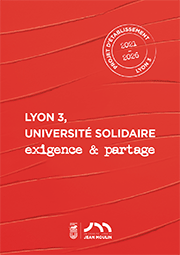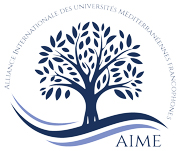AccueilRechercheProgrammes et productions scientifiquesThèsesThèses soutenuesThèses soutenues - 2006-2021Thèses soutenues - 2012
-
Partager cette page
- Recherche,
AUGOYARD Marc
Les procédures de révision des Traités de l'Union Européenne. Contribution à l'étude de la rigidité en droit de l'Union Européenne.
Publié le 12 juillet 2012 – Mis à jour le 28 août 2012
Thèse en Droit communautaire soutenue le 18 Mai 2012
Acte unique européen, Maastricht, Amsterdam, Nice, Lisbonne, élargissements… les grandes révisions des traités de l’Union européenne se sont succédé à un rythme soutenu en vingt-cinq ans. Si cette série est nécessaire dans un processus évolutif d’intégration, elle montre également la difficulté de réformer l’Union. L’objet de cette étude est de déterminer le degré de rigidité des traités de l’Union européenne, en recherchant les causes, les obstacles et les conséquences juridiques de cette (in)adaptabilité des traités. La rigidité trouve sa source dans le processus de constitutionnalisation des traités qui a renforcé leur protection formelle et matérielle par l’émergence de limites au pouvoir de révision. La rigidité des traités est par ailleurs accentuée par celle de la procédure de révision ordinaire qui est fondée sur deux notions qui peuvent sembler antinomiques : le respect de la souveraineté des États membres, par la pluralité des mécanismes nationaux de ratification, et la volonté de démocratisation, par l’émergence de mécanismes européens de légitimation. Pour faciliter l’adaptabilité des traités, les États membres ont institué des procédures simplifiées, complémentaires et dérogatoires à la procédure de droit commun. Leur insuffisante distinction par rapport à la procédure de révision ordinaire les rend inefficaces, si bien que l’on assiste à une remise en cause de la rigidité des traités par le développement d’une révision implicite de leurs dispositions et d’une coopération entre les États membres à l’intensité différenciée voire hors du cadre institutionnel de l’Union. La recherche de moyens efficaces d’assouplissement de la rigidité des traités est donc nécessaire afin de conserver à la fois leur rang dans l’ordre juridique et l’unité du processus d’intégration européenne dans le cadre de l’Union européenne.
Single European Act, Maastricht, Amsterdam, Nice, Lisbon, enlargements… Over a 25-year period, the major revisions of the European Union treaties followed one another at an intensive pace. If that series is necessary for a progressive process of integration, it also illustrates the challenge of reforming the Union. The purpose of this study is to determine the level of rigidity of the European Union Treaties by searching the legal causes, obstacles and consequences of the (in)adaptability of the treaties. Rigidity originates from the constitutionalisation process of the treaties, which consolidated their formal and substantial protection through the emergence of limits to the revision power. The rigidity of the treaties is further increased by that of the ordinary revision procedure, which is based on two notions that may appear antinomic: the respect of the Member States sovereignty (through the plurality of the national mechanisms of ratification), and the willingness of democratisation (through the emergence of European mechanisms of legitimacy). In order to facilitate the adaptability of the treaties, the Member States established simplified procedures, which complement and derogate to the general procedure. As they do not significantly differ from the ordinary revision procedure, they are not efficient; a reconsideration of the rigidity of the treaties can then be observed through the development of an implicit revision of their provisions as well as a cooperation between Member States, the intensity of which is differentiated, and which may grow beside the Union’s institutional framework. Therefore, the pursuit of efficient ways to relax the rigidity of the treaties is necessary to maintain both their position within the legal order and the unity of the European integration process within the framework of the European Union.
Mots-clés : intégration européenne ; révision ; constitution ; traités européens ; convention ; constitutionnalisation ; ordre juridique de l’Union européenne ; traité de Lisbonne ; révision implicite ; pratique institutionnelle ; coopération ; élargissement ; contrôle juridictionnel.
Key words : European integration ; revision ; constitution ; European treaties ; convention ; constitutionalisation ; legal order of the European Union ; Treaty of Lisbon ; implicit revision ; institutional practice ; cooperation ; enlargement ; jurisdictional control.
Directeur de thèse : Thierry DEBARD
Membres du jury :
Thierry DEBARD, Professeur, Université Jean Moulin Lyon 3
Hélène GAUDIN, Professeur, Université de La Rochelle
Eric CARPANO, Professeur, Université d'Auvergne
Henri OBERDORFF, Professeur, Université Grenoble 2 Pierre Mendès-France
Philippe BLACHER, Professeur, Université Jean Moulin Lyon 3
Président du jury : Henri OBERDORFF
Mention : Très honorable avec les félicitations du jury
Equipe d'accueil : Centre de droit constitutionnel
Single European Act, Maastricht, Amsterdam, Nice, Lisbon, enlargements… Over a 25-year period, the major revisions of the European Union treaties followed one another at an intensive pace. If that series is necessary for a progressive process of integration, it also illustrates the challenge of reforming the Union. The purpose of this study is to determine the level of rigidity of the European Union Treaties by searching the legal causes, obstacles and consequences of the (in)adaptability of the treaties. Rigidity originates from the constitutionalisation process of the treaties, which consolidated their formal and substantial protection through the emergence of limits to the revision power. The rigidity of the treaties is further increased by that of the ordinary revision procedure, which is based on two notions that may appear antinomic: the respect of the Member States sovereignty (through the plurality of the national mechanisms of ratification), and the willingness of democratisation (through the emergence of European mechanisms of legitimacy). In order to facilitate the adaptability of the treaties, the Member States established simplified procedures, which complement and derogate to the general procedure. As they do not significantly differ from the ordinary revision procedure, they are not efficient; a reconsideration of the rigidity of the treaties can then be observed through the development of an implicit revision of their provisions as well as a cooperation between Member States, the intensity of which is differentiated, and which may grow beside the Union’s institutional framework. Therefore, the pursuit of efficient ways to relax the rigidity of the treaties is necessary to maintain both their position within the legal order and the unity of the European integration process within the framework of the European Union.
Mots-clés : intégration européenne ; révision ; constitution ; traités européens ; convention ; constitutionnalisation ; ordre juridique de l’Union européenne ; traité de Lisbonne ; révision implicite ; pratique institutionnelle ; coopération ; élargissement ; contrôle juridictionnel.
Key words : European integration ; revision ; constitution ; European treaties ; convention ; constitutionalisation ; legal order of the European Union ; Treaty of Lisbon ; implicit revision ; institutional practice ; cooperation ; enlargement ; jurisdictional control.
Directeur de thèse : Thierry DEBARD
Membres du jury :
Thierry DEBARD, Professeur, Université Jean Moulin Lyon 3
Hélène GAUDIN, Professeur, Université de La Rochelle
Eric CARPANO, Professeur, Université d'Auvergne
Henri OBERDORFF, Professeur, Université Grenoble 2 Pierre Mendès-France
Philippe BLACHER, Professeur, Université Jean Moulin Lyon 3
Président du jury : Henri OBERDORFF
Mention : Très honorable avec les félicitations du jury
Equipe d'accueil : Centre de droit constitutionnel
Documentation
Mise à jour : 28 août 2012







